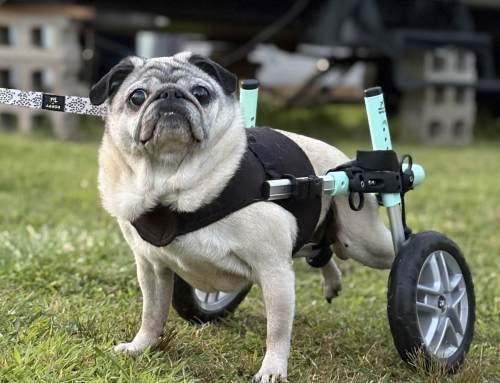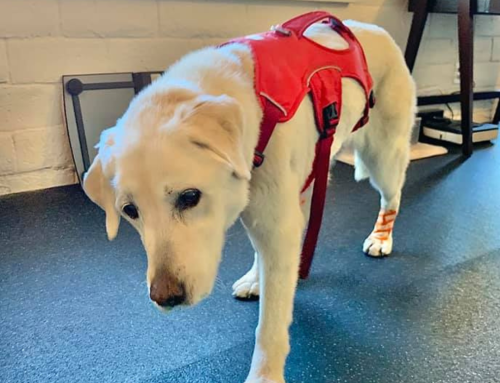If your dog has laryngeal paralysis or GOLPP you may have heard of the medication Doxepin and that it might help. But what is it? Is it safe to use? And will it help your dog?

Doxepin (Sinequan®) is a human tricyclic antidepressant that is often used to treat migraines, depression and sleep issues. It has also been reported to help dogs with laryngeal paralysis breath easier. The benefits of Doxepin were found by accident when a vet tried giving his dog Doxepin and found it also helped with his dog’s breathing. To date, there has only been one published study on the use of Doxepin in dogs with laryngeal paralysis and it did not find it to have any effect on quality of life. An often sited unpublished survey reported positive benefits in 83% of cases. Despite the lack of research supporting it’s use, many owners and vets report positive results from using Doxepin. It seems it either works or it doesn’t.
How does Doxepin help my dog with Laryngeal Paralysis?
It isn’t really known how Doxepin helps dogs with laryngeal paralysis. It is possible that it provides a slight sedating effect. It has also been proposed that it reduced neuropathic pain (though laryngeal paralysis IS NOT a painful condition) and reduces spasms of the laryngeal muscles. Doxepin should only be used in dogs with mild to moderate breathing issues. It is not appropriate for dogs with severe breathing issues or dogs that are in a breathing crisis. Note: a breathing crisis ALWAYS necessitates veterinary involvement immediately.
If Doxepin does work owners may notice:
- Reduction in noisy breathing/stridor at both rest and with activity
- Increased ability to exercise
- Reduction in coughing/gagging
- Decreased work of breathing
- Improved overall quality of life
What are the side effects of Doxepin?
There are few side effects reported following administration of Doxepin which may suggest that a short term trial is relatively low risk. Reported side effects include:
- Lethargy
- Hyperexcitability
- Dry mouth
Can other antidepressants help like Doxepin?
The short answer is no one knows. Because the benefits of Doxepin were found by accident, it isn’t known if other similar medications may also provide benefit. It is possible that as the benefits of and means by which Doxepin work are further explored, other medications will be found to be beneficial.

How do I get Doxepin for my dog?
Without exception, the use of Doxepin should always be discussed with your veterinarian. They are best equipped to determine any reason your dog should NOT take this medication (such as a heart issue) and can also determine appropriate dosing for your dog. Your vet can also assist with monitoring symptoms and determining if the ongoing use of Doxepin is appropriate for your dog. The use of Doxepin is off-label, as it has not been approved for use in dogs.
In the one published study on Doxepin, it was recommended that a trial of Doxepin last one month. At that point they felt an owner/vet would know if Doxepin was having any benefit.
References:
Rishniw, Mark et al. “Effect of doxepin on quality of life in Labradors with laryngeal paralysis: A double-blinded, randomized, placebo-controlled trial.” Journal of veterinary internal medicine vol. 35,4 (2021): 1943-1949. doi:10.1111/jvim.16162
Buzby, Julie. “Canine Laryngeal Paralysis: A Veterinarian Answers Your Questions.” Dr. Buzby’s ToeGrips for Dogs, 22 July 2022, https://toegrips.com/canine-laryngeal-paralysis/
Looking for more information about laryngeal paralysis or GOLPP? Visit our sister website golpp.com for more information and FREE resources.




